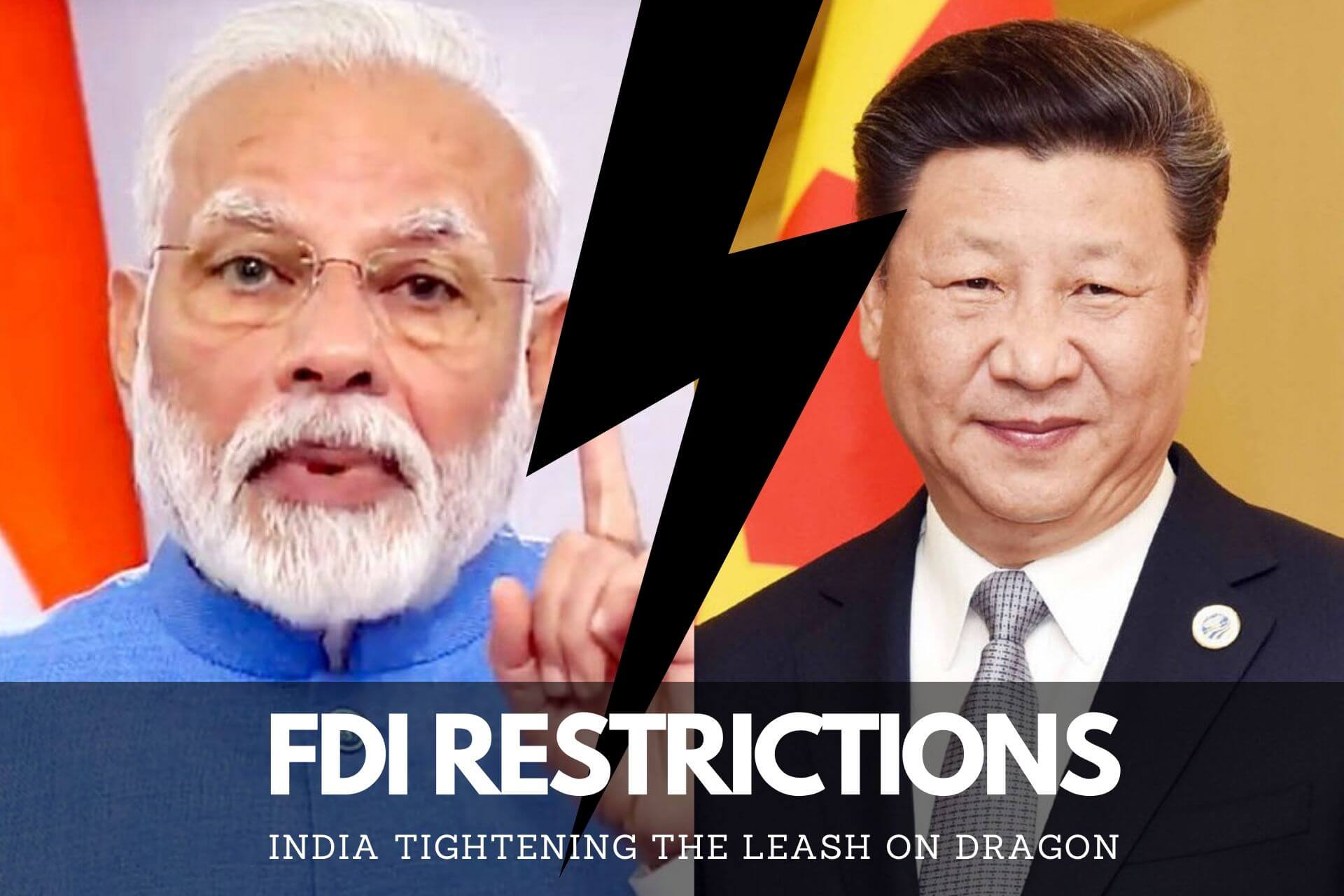“You need to revise discriminatory FDI restrictions, it is against the WTO principles of Non-discrimination and against free and fair trade” – Statement by China Embassy
The above statement came after the Indian government sanctioned new restrictions on FDI investment in India. According to these new sanctions, all the investments made by the neighboring countries in India will be under tighter scrutiny. These new rules have been specifically made keeping FDI flows from China in mind. India is trying to safeguard its interest by imposing these entry rules, as it is worried about the opportunistic takeover of Indian firms by Chinese firms in these financially vulnerable times.
As per these new sanctions, any companies (from countries that share its borders with India) will have to approach the Indian Government for permission, if they want to invest in India. Before these new sanctions, they could invest via the direct route in India. One needs to understand the fact that these new sanctions do not cap any limit on investment, it just reroutes the way to do it.
The existing FDI policies were earlier limited only to Pakistan and Bangladesh. Now, these new rules bring China, Nepal, Bhutan, and Myanmar within its gamut.
But why this sudden imposition of sanctions by India? This can be simply attributed to the fact that because of the COVID -19 pandemic, all the major stock indexes have taken a big hit and it’s made the valuation of all the companies very economical, vulnerable and attractive. So, to prevent the interest of these companies been taken over by opportunistic firms from neighboring border sharing countries, these new sanctions have been imposed.
Also read: Why did Indian Stock Market Crash in 2020? Causes & Effects!
 According to a press note released by the Department for promotion of Industry and Internal trade on 17th April 2020,
According to a press note released by the Department for promotion of Industry and Internal trade on 17th April 2020,
“A Non-resident entity can invest in India except for sectors or activities which are prohibited. However, an entity of country which shares its borders with India or where the beneficial owner is a citizen of country which shares its borders with India, can invest only via Government route.”
In addition to this, a company incorporated in Pakistan can invest only via Government permission, only in sectors other in defense, atomic energy and other sectors prohibited in foreign investment policy.
An article published in the Times of India states that “this move is very similar to barrier imposed by other countries like Germany, Spain, Italy, and Australia to block predatory capital for hostile takeover by China”
Now, what is the difference between the Automatic route and the Government route?
In simple terms, through the automatic route, the investor has to just inform RBI about the investment made while in case of government route, the investor has to take permission from a particular ministry or department.
According to an estimate by India-China economic council, an estimated Greenfield investment of 4 billion USD (Rs. 30,000 crores) has been made in Indian startups. Such has been the growth of investment in the Indian market by Chinese investors. So, is it the right time for India to tighten its FDI policy stance? Only time will tell. But for the moment, India has safeguarded its long term considerations by blocking hostile buyouts and takeovers.
Moreover, as per the data published by the Department for Promotion of Industry and Internal Trade,
“Between 2000 and 2019, FDI received from China was estimated around $2.3 billion dollars (nearly 14500 crore rupees) and all the other border sharing nations invested a combined FDI of 71 crore rupees”
This clearly explains the fear factor of the Indian Government.

The last nail in the coffin to introduce this policy by India would have been the purchase of 1.75 crore shares of HDFC Bank by China’s peoples Bank which increase its share in HDFC Bank to 1% from 0.2% earlier. This move is to safeguard the interest of Indian firms because of their current financial vulnerability.
Also read: China’s central bank buys 1% stake in HDFC
Other major investments in India come via third part routes like Singapore. For example, $ 500 million (Rs. 3500 crores) investment from Singapore subsidiary firm Xiaomi (China Origin) should also have to be added to official statistics as this investment indirectly comes from country sharing a border with India.
The reports published by the ministry of finance do show a huge investment to the tune of $4 billion. This investment comes via online wallet like Paytm (backed by Alibaba), BigBasket, and cab service provider like Ola (sizable investment from China). Mobile phone manufacturers like Vivo, Oppo, and other Chinese phone manufacturers. In the Pharma sector, the acquisition of Gland pharma by Fosun Pharma for $1.1 billion, etc. are some of the direct and indirect investment by China in India.
These new policies won’t be applicable to the existing investment but any future investment will have to follow the new policy rules. Therefore, the latest rules imposed by India might look like a decision taken in haste, but these sanctions were always on cards. The breakout of the COVID-19 epidemic made this decision quicker and faster. So, to answer China’s claim that India is breaking the WTO rules of free trade, one can simply say that there is no restriction on investment that can be made but it has to be just done via Government route.
Anyways, a few questions still remain unanswered:
- “It remains to be seen as to what would be the implications of these FDI sanctions over long time?”
- “Looking at the gravitas of these sanctions, how does the future of trade and investment shape up for these two Asian giants?”
- “Considering the importance of China and its expertise in technology and infrastructure, will the restrictions be relaxed in the future?”
Also read: What does Weakening Rupee Against Dollar Signify?
References:
- New FDI Rules Not Violation, Say Government Sources On China Criticism – NDTV India
- Govt approval must for all FDIs from neighbouring countries including China
- Press release by Ministry of Commerce & Industry, Government of India dated 18/04/2020
- The Economic Times newspaper dated 18/04/2020, 20/04/2020 The Times of India dated 18/04/2020, 20/04/2020

Hitesh Singhi is an active derivative trader with over +10 years of experience of trading in Futures and Options in Indian Equity market and International energy products like Brent Crude, WTI Crude, RBOB, Gasoline etc. He has traded on BSE, NSE, ICE Exchange & NYMEX Exchange. By qualification, Hitesh has a graduate degree in Business Management and an MBA in Finance. Connect with Hitesh over Twitter here!






